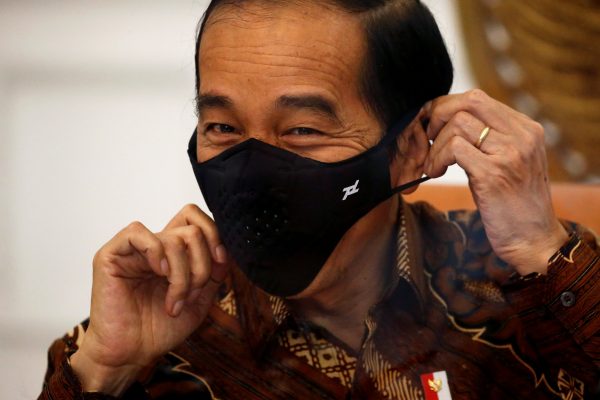Indonesia’s decentralised government, large informal economy, high rates of smoking and non-communicable disease, and under-resourced health care system meant that the country was going to be highly vulnerable to COVID-19 no matter who was in charge. But Indonesia has performed worse than many countries at similar levels of development, due in no small part to a government response that was focussed more on politics than public health.
The national government started from a position of complacency, openly downplaying the threat the coronavirus posed to Indonesia. When case numbers began to mount throughout March and April, regional politicians with their eyes on the 2024 presidential election saw the opportunity to get out in front of the Jokowi administration. Most notable was the ambitious governor of Jakarta, Anies Baswedan, who declared a pre-emptive lockdown in the national capital only to have his efforts undermined by national authorities.
When the national government finally realised the gravity of the situation, its first instinct was to minimise political damage. The government framed the pandemic as a political and security problem, giving military men high-profile roles in the government’s pandemic response and allowing police to harass government critics. The government prioritised maintaining economic activity, fearful of the popular backlash that a prolonged lockdown might have generated, and pushed through a big stimulus package.
The human costs of this strategy have been severe. As of 31 December 2020, Indonesia was recording over 8000 infections a day — and on the back of low testing rates. At least nine cabinet ministers have reportedly been infected with COVID-19, with most keeping their diagnoses secret from the public. An even more grim indicator of the ravages of COVID-19: graveyards in major cities have been running out of space as death rates spike.
Yet subordinating health concerns to the economy has proven popular. A nationwide survey conducted in late December showed that two in three Indonesians approved of the government’s performance, despite a huge drop in perceptions of economic conditions. Certainly, the economic damage from the pandemic is real. But by not leaning too heavily on a lockdown strategy, the government appears to have made itself a small target. Voters appear to have directed the blame for economic losses towards the virus, and to society at large for neglecting social distancing.
Confident in its political standing, in October the government pushed through controversial microeconomic reforms via its omnibus Law on Job Creation. Whatever the merits of the law itself, the process by which it was passed speaks to growing dysfunction in key democratic institutions in Indonesia. With almost all political parties co-opted into the Jokowi government coalition after the 2019 election, the parliament rubber-stamped the bill after a rushed and opaque process that experts say ignored the parliament’s own standing orders.
Unions and civil society were incensed by a lack of engagement from the government on the omnibus law. By contrast, the business lobby was intimately involved in its drafting from the start, having thrown its weight firmly behind Jokowi in the 2019 election. It’s difficult not to read the law’s liberalisation of industrial relations and ‘simplification’ of environmental safeguards as a post-election gift to domestic business — particularly major employers and the resources industry — rather than a serious attempt to address Indonesia’s challenges in attracting high-quality FDI.
The omnibus law dodges the core issues that make foreign firms wary of Indonesia: uncontrolled corruption, a nationalistic political climate and favouritism towards SOEs. Nothing that happened in 2020 suggested a newfound determination on the administration’s part to solve these problems. Indeed, graft reared its head at the year’s end when the Corruption Eradication Commission defied predictions of its obsolescence by nicking two cabinet ministers on bribery charges.
Ultimately the pandemic has done little to shift Indonesia’s political trajectory, at best intensifying trends that were in train beforehand. Despite his comfortable re-election in 2019, Jokowi remains highly attuned to his potential political vulnerability, aware that as an outsider to the party establishment his main political resource is public approval. This has meant another year of playing to his popular and elite support bases, avoiding some hard but necessary policy decisions, and anathemising organised opposition as radical or disloyal.
Still, the longer the pandemic impacts the health and livelihoods of Indonesians, the less confident the government can be of its political dominance. For that reason, there is a lot at stake in the rapid rollout of a vaccine in early 2021 — a complex and expensive undertaking, but one that is a necessary condition for Indonesia getting back to normal.
Liam Gammon is a PhD candidate in the Department of Political and Social Change at the Coral Bell School of Asia Pacific Affairs, The Australian National University.
This article is part of an EAF special feature series on 2020 in review and the year ahead.
This article is part of an EAF special feature series on the novel coronavirus crisis and its impact.


Other factors: Widespread disbelief there’s a virus because bodies not seen and no-one from the family / street / village known to be sick. Deaths are often attributed to Allah calling. PMs are rare. Even those diagnosed with Covid-19 are said to be dying ‘with’ not ‘from’ the virus.
There’s a fear of seeing a doc as this may lead to a costly test (min Rp 150,000) and admission to hospital, a place to be feared for many. BPJS cover rates are reported to be falling.
No mention of the FPI, Jokowi’s belated crackdown on Rizieq Shihab and how this might play out.
Jokowi is ‘popular’because there’s no strong voice articulating alternatives – though this isn’t exclusive to RI.
Overall – confusion and a numb electorate with no clear point of opposition, apart from the Omnibus Bill protests which seem to have run out of energy.